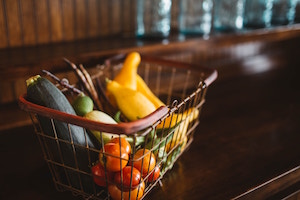Kindness & other Essential Nutrients

Every week a couple of my patients say or do something that strikes me. “Thank you for being kind,” were the words of one woman. I wasn’t being particularly kind in my mind. What I was doing was taking her concerns seriously which she had expressed was a new experience for her. In Functional Medicine we deliberately spend more time with patients. We value the insights that emerge from listening to what’s happening to them. We look at diet and lifestyle as primary interventions. I also seek to understand how the mind is working for or against the process of regaining health.
Another patient commented on an article she read. It stated that all protein comes from plants. She was asking how then could her diet have played a role in the deficiencies that showed up in her lab work? People can feel fine on a vegetarian diet for years. Often this is followed by either a health crisis or a slower process leading to poor recovery, low immunity, hormonal imbalances, brain fog, fatigue or a host of other symptoms.
Nutrients that are essential for life are accessed by eating a wide variety of food. For 66,000 generation humans ate meat, fish, fruit, vegetables, nuts/seeds, starchy tubers and other plants. Macro nutrient ratios certainly varied geographically however no one was eating the refined foods we see on the shelves of every grocery store today. We are adapted to thrive based on how we have adapted for most of our evolution.
Evolutionary biologist Theodosius Dobzhansky once said, “Nothing in biology makes sense except in the light of evolution.”
When our environment changes faster than we can adapt, a mismatch occurs. This is what has happened with the advent of industrial agriculture. Traditional agriculturalists knew to prepare grains and legumes properly to lessen the impact of nutrient inhibitors. We also know traditional cultures were not vegan and those who ate mostly vegetarian didn’t do so by choice. Let’s look at why.
Nutrient Inhibitors
Oxalate and phytate from grains and legumes inhibit nutrients absorption of calcium, zinc and iron for example. I see many patients with low iron. At least part of the reason is because plant-based iron is impaired by things that people consume every day like coffee, tea, and dairy products. This explains why vegetarian diets are known to reduce plant-based iron absorption by 70 percent. On the other hand, calcium is the substance that inhibits the absorption of iron from animal products. Heme iron is highly absorbable and its much more cost effective to get it from food as opposed to supplements.
Vegetarian diets also have been shown to reduce zinc absorption by 35 percent. Plant foods containing zinc also contain phytic acid. Someone may be consuming the recommended daily allowance (RDA) for zinc but if its all plant based they can still be deficient.
Precursor vs. Active Forms
EPA and DHA are the long-chain omega-3 fats. Occasional a patient will say to me that they take a vegan or vegetarian source of these essential oils. The problem is that little of the plant-based ALA gets converted into DHA.
Vitamin A is another essential nutrient that is widely misunderstood. Beta carotene is the precursor that is found in plant foods and fortified foods. Retinol is the active form. Humans are not good at converting beta carotene to retinol. The RDA for retinol is a tenth of what our ancestors consumed and thrived on. To get just the RDA would require us to eat an enormous amount of plants like carrots, sweet potatoes and kale everyday whereas one serving of liver would be enough for the whole week. I’m not suggesting that we don’t also eat vegetables. In fact I want everyone to eat the rainbow in vegetables but this isn’t enough.
If you go to your local butcher or the meat department at the grocery store, you’ll find out that liver often gets thrown out. Doesn’t it make sense to use this instead supplementing out of a plastic bottle?
Nutrient synergy.
Most nutrients require the presence of other nutrients, called cofactors, to allow absorption. We talked about the conversion of ALA to DHA. The cofactors that this conversion depends on are zinc, iron, and B6. Most vegetarians and vegans are unlikely to get enough in their diet of any of these essential nutrients.
The reason I suggest cod liver oil to most patients, especially in the winter, is because it nails all the points I’ve listed above. Its a synergistic and bioavailable source of essential vitamins D and A in its active form. It also contains EPA and DHA. Eat some oysters and you’ll get a good dose of zinc, B6 and B12. For iron, enjoy a serving of liver pate and you are set! These are the real superfoods.
Creating Kindness
Most vegans need to supplement B12 and vitamin D at the very least to maintain health. Enough retinol, or the active form of vitamin A, EPA and DHA, zinc, iron, and calcium also needs to be consumed and absorbed for long term wellness.
Insomnia and anxiety or depression can be rooted in low iron. This is an example of how a deficiency of one essential nutrient can have wide reaching consequences.
The opposite is also true. When I start patients on an ancestral diet, treat the gut and rule out other causes of malabsorption they feel more alive and ready to make a difference in the world. The potential of creating a kinder world rests on our ability to be healthy and well-resourced. This is what preventative medicine is all about.
.
Related Posts
 A Sense of Belonging or Coming Home
A Sense of Belonging or Coming Home





